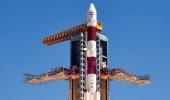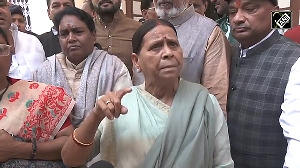“I am really grateful to the entire ISRO family for having worked this hard and making IRNSS-1I a success,” said the space centre’s chief K Sivan.

India on Thursday successfully launched into space a navigation satellite for a constellation of spacecraft dubbed as its home-made Global Positioning System that can serve both military and civilian needs.
The Indian Regional Navigation Satellite System (IRNSS), also called NavIC--Navigation with Indian Constellation--is considered on par with United States-based GPS, Russia's Glonass and Galileo developed by Europe. It will broadcast highly-accurate timing signals that a receiver can use to triangulate its location.
In a pre-dawn launch, the IRNSS-1I navigation satellite, which is essentially a replacement satellite, was injected into the designated orbit by the Indian Space Research Organisation's workhorse Polar Satellite Launch Vehicle(PSLV). It is the eighth navigation satellite launched by the ISRO.
The PSLV-C41/IRNSS-1I Mission blasted off at 4.04 am from the first launchpad at the Satish Dhawan Space Centre in Sriharikota in Andhra Pradesh, ISRO officials said, adding
it was a normal lift-off.
The PSLV injected the satellite into orbit 19 minutes after its lift-off. It was the 41st successful mission for the PSLV, officials said.
The 1,425-kg satellite made by Bengaluru-headquartered Alpha Design Technologies, in collaboration with ISRO, is the second satellite to be actively built by the private industry.
The first, IRNSS-1H, could not be put into space because of its failure in August last year.
Built for a 10-year job in space, IRNSS-1I is expected to be ready for work in about a month after routine orbit manoeuvres and tests.
ISRO Chairman K Sivan described the mission as a success and congratulated the scientists.
IRNSS-1I was successfully placed in the designated orbit and it was a precision injection, he said.
Sivan said the NavIC constellation is really going to create history and make innovative applications to the entire community in the ocean-based services especially for the underserved and unserved.
"I am confident that the NavIC constellation will serve the underprivileged and unserved for years to come. I am really grateful to the entire ISRO family for having worked this hard and making IRNSS-1I a success," he added.
"Very recently using the NavIC applications we have created an app that will be released very soon. I request industry and institutions to come forward to take these applications to the user community".
Prime Minister Narendra Modi congratulated ISRO scientists for the successful launch of IRNSS-1I and said it will benefit the common man of the country.
'Congratulations to our scientists on the successful launch of navigation satellite IRNSS-1I by PSLV. This success will bring benefits of our space programme to the common man. Proud of team @isro!' the prime minister tweeted.
IRNSS-1I is expected to replace IRNSS-1A, the first of the seven navigation satellites, that was rendered ineffective after its three rubidium atomic clocks failed.
WATCH: ISRO launching IRNSS-1I navigation satellite
The seven satellites are part of the NavIC navigation satellite constellation. India needs seven operational satellites for providing failsafe satellite based navigation.
The launch is ISRO's second attempt at sending a replacement satellite.
The constellation will also provide signals in a space covering India and its surroundings, which could be utilised by using receivers on ground to determine position and time accurately.
The previous mission of a PSLV carrying IRNSS-1H in August last year failed after the heat shield covering the satellite failed to separate.
The IRNSS-1I mission takes place two weeks after the space agency launched GSAT-6A on board GSLV Mk-II. Though the rocket placed GSAT-6A in orbit, the ISRO lost communication with the satellite.
Like its predecessors, IRNSS-1I carried two types of payloads: Navigation and Ranging.
He lauded the team for working tirelessly to make the PSLV-C41/IRNSS-1I a success after a major GSLV mission.
"Today is really a wonderful day for all of us. We have achieved a precise mission. After a major GSLV mission, 14 days back, we have successfully launched IRNSS-1I.
"I must congratulate the entire ISRO team for this wonderful achievement. Essentially in the last 14 days the entire ISRO community worked tirelessly to achieve this mission," Sivan said.











 © 2025
© 2025